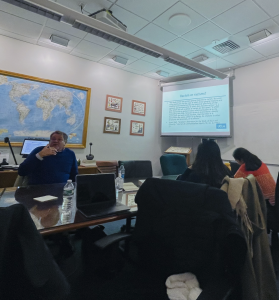Contributed by Apoliana da Conceição dos Santos

During the César J. Ayala Workshop on the Comparative Study of Race in the Americas, Professor Ayala illuminated the nuanced nature of racism, emphasizing its variation across different regions. He underscored the ineffectiveness of importing U.S. racism into other contexts, highlighting the unique manifestations of racism in each country. Through thought-provoking questions, he prompted attendees to reflect on the nature of racism and white supremacy in our respective homelands. Professor Ayala’s presentation went through popular concepts such as systemic racism, institutional racism, structural racism, and white supremacy, offering empirical insights and comparative analyses of scholarships. Drawing on studies of racial inequality in Puerto Rico, he provided us with a comprehensive understanding of the complex dynamics at play. Particularly interesting to me were his references to Brazilian perspectives on race, exemplified by the documentary Preto X Branco, which contrasts with American views. Additionally, his recommendation of Edward Telles’ book Race in Another America: The Significance of Skin Color in Brazil further enriched the discourse, offering deeper insights into the complexities of race in the Americas.
In conclusion, it is evident that racism manifests differently across various regions. Importing U.S. racism does not alter the underlying realities of one’s own country. Questions such as ‘What is racism like in your country?’ and ‘What is white supremacy in your country?’ prompt us to consider the unique socio-cultural contexts shaping these phenomena. Furthermore, education correlates with increased awareness of one’s racial identity. Ultimately, acknowledging these complexities is essential for fostering meaningful dialogue and enacting positive change.